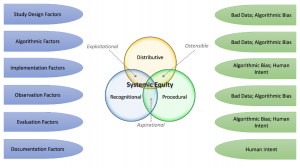Bolstering environmental data science with equity-centered approaches
USA, May 16, 2024 /EINPresswire.com/ -- In a significant stride toward justice in environmental sciences, a recent study has unveiled the urgent necessity of embedding equity throughout all phases of environmental data science and machine learning research and application.
Environmental data science and machine learning (ML) are increasingly vital for addressing ecological challenges. However, these technologies can inadvertently perpetuate biases present in their training data, leading to socioecological inequities. The field faces issues such as data integrity, algorithmic bias, and model overfitting, which necessitate a deeper understanding and more equitable approaches. The current debate and evolution in this area underscore the importance of embedding equity throughout research and design domains to ensure fair and unbiased outcomes.
A paradigm shift towards integrating socioecological equity into environmental data science and machine learning (ML) is advocated in a new perspective article (DOI: 10.1007/s11783-024-1825-2) published in the Frontiers of Environmental Science & Engineering. Authored by Joe F. Bozeman III from the Georgia Institute of Technology, the paper emphasizes the importance of understanding and addressing socioecological inequity to enhance the integrity of environmental data science.
This study introduces and validates the Systemic Equity Framework and the Wells-Du Bois Protocol, essential tools for integrating equity in environmental data science and machine learning. These methodologies extend beyond traditional approaches by emphasizing socioecological impacts alongside technical accuracy. The Systemic Equity Framework focuses on the concurrent consideration of distributive, procedural, and recognitional equity, ensuring fair benefits for all communities, particularly the marginalized. It encourages researchers to embed equity throughout the project lifecycle, from inception to implementation. The Wells-Du Bois Protocol offers a structured method to assess and mitigate biases in datasets and algorithms, guiding researchers to critically evaluate potential societal bias reinforcement in their work, which could lead to skewed outcomes.
Highlights
● Socioecological inequity must be understood to improve environmental data science.
● The Systemic Equity Framework and Wells-Du Bois Protocol mitigate inequity.
● Addressing irreproducibility in machine learning is vital for bolstering integrity.
● Future directions include policy enforcement and systematic programming.
"Our work is not just about improving technology but ensuring it serves everyone justly," said Joe F. Bozeman III, lead researcher and professor at Georgia Institute of Technology. "Incorporating an equity lens into environmental data science is crucial for the integrity and relevance of our research in real-world settings."
This pioneering research not only highlights existing challenges in environmental data science and machine learning but also offers practical solutions to overcome them. It sets a new standard for conducting research that is just, equitable, and inclusive, thereby paving the way for more responsible and impactful environmental science practices.
DOI
10.1007/s11783-024-1825-2
Original Source URL
https://doi.org/10.1007/s11783-024-1825-2
Funding information
I would like to thank the National Science Foundation of the USA for Facilitating Funded Network Building, Convergence Exploration, and Equity Concept Development (Nos. 2115405, 2241237, and 2115453). Each of these funded efforts were distinctly meaningful in the development of this perspective.
Lucy Wang
BioDesign Research
email us here
Legal Disclaimer:
EIN Presswire provides this news content "as is" without warranty of any kind. We do not accept any responsibility or liability for the accuracy, content, images, videos, licenses, completeness, legality, or reliability of the information contained in this article. If you have any complaints or copyright issues related to this article, kindly contact the author above.

